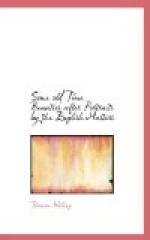“Which, like the morning’s
glow
Hints a full day below.”
A later president of the Academy, Sir Martin Shee, has shown us that face in the noonday of its matronly beauty, and the gentle character and sweet sensibility yet outshine through the mask of the flesh as in the earlier pictures.
Lady Bingham was careful of the education and company of her daughters. The girls were musical, and Lavinia excelled in painting as well. Walpole writes of her being in Italy, in 1785, with Mrs. Damer, his sculptor friend, and of her drawing with very great expression. He was not so complimentary of her music some years before, when he tells of being invited to Lady Lucan’s to hear her daughters sing Jomelli’s “Miserere,” set for two voices: “It lasted for two hours, and instead of being pathetic was eminently dull, until at last I rejoiced when ‘the two women had left the sepulchre.’”
Shortly after this he tells of rumors of the attachment of George John, Lord Althorp, brother of Georgiana of Devonshire, to “that sweet creature” Lavinia. At dinner at Lord Lucan’s, Lord Althorp sat at a side table with the girls and a Miss Shipley. “Pray, Lady Spencer,” said Walpole, “is it owned that Lord Althorp is to marry—Miss Shipley?” His next reference to the Lucans is in regard to the wedding ode printed on the Strawberry Hill press. The poet therein invokes blessings in this wise:—
“Shine forth, ye silver eyes
of night,
And gaze on virtues crowned with
treasures of delight.
* * * * *
“Flow smoothly, circling hours,—
And o’er their heads unblended
pleasure pour;
Nor let your fleeting round
Their mortal transports bound,
But fill their cup of bliss, eternal
powers,
Till time himself shall cease, and
suns shall blaze no more.”
He essays to eulogize the bride:—
“Each morn reclined on many
a rose,
Lavinia’s pencil shall disclose
New forms of dignity and grace,
The expressive air, the impassioned
face,
The curled smile, the bubbling tear,
The bloom of hope, the snow of fear,
To some poetic tale fresh beauty
give,
And bid the starting tablet rise
and live;
Or with swift fingers shall she
touch the strings,
Notes of such wondrous texture weave
As lifts the soul on seraph wings.”
He then proceeds to encourage Althorp to lead a strong, noble life, devoting his great abilities to the state, though he laments the small chances for genuine sterling worth to achieve eminence.
“In this voluptuous, this abandoned age,”
when the leaders of the country are
“Slaves of vice and slaves of gold.”
There was much fitness in this poet essaying a homily for the groom’s benefit, for he had been the young man’s tutor some years before. When the first Earl—a man of most fascinating manners—placed his son in the tutor’s charge, he said, “Make him, if you can, like yourself and I shall be satisfied.” Johnson said of Sir William Jones, “The most enlightened of the sons of men.” He became a great Indian and Persian scholar, and was ever an honored friend of his former pupil.




